
Lose weight effectively
Complexities, desire to refine your figure, health problems... There are multiple reasons leading to the desire to lose weight. For women, weight has long been a merciless struggle. And if the view given to weight slowly begins to soften, for many, weight is a primary concern.
Whatever your motivations for wanting to lose weight, there are many ways to achieve it. Diets, detox cures, intermittent fasting, change of diet... but how can you be sure to find the solution that will work in the long term? We reveal the best tips for lasting weight loss.
The desire to lose weight
Losing weight represents a more or less significant struggle for many women. Sometimes this lasts for years. The different stages of life invite the body to change, to adapt, and it is sometimes difficult to accept this. Among the reasons that can motivate a person to lose weight, we find:
- Self-acceptance;
- Change silhouette;
- Better health ;
- Challenge yourself;
- Repair your relationship with yourself/your body;
- Regain self-esteem;
- Increase your self-confidence…etc.
The hardest part is not making the decision to lose weight, but actually sticking to it. This is a process that sometimes takes longer than we would like.
Change your eating habits
The most reasonable way to lose weight in a lasting and non-frustrating way is to change your eating habits. By doing this, you are able to get the vitamins, minerals, and energy you need from food, while slowly losing weight at the same time.
You will have control over your weight and eat healthier. Your health remains in good shape and the numbers on the scale decrease. However, it is essential to make a smooth transition so as not to “crack” after a few days. Habits are well established and a gentle change will allow your body to get used to your new pattern without rushing or frustrating it.
New mealtime habits
Diverse, colorful and balanced dishes
Preparing your meals with care, color and diversity brings “good humor” to the plate. It’s a meal that will then be more appreciated. As for balance, it is important to distribute a variety of foods on your plates. A dairy product, vegetables, fruits, a source of protein…etc.
Choose your foods wisely
Although you should not exclude all foods from your meals when losing weight, it is still advisable to turn to foods with low calorie density. Among them, we can cite:
- Cucumber, lettuce, Chinese cabbage, radishes, asparagus…;
- Watermelon, grapefruit, tomato, lemon, rhubarb…;
- Low-fat white cheese;
- Oatmeal;
- White meats and fish rather than red meat;
- Walnuts, hazelnuts…etc.
Take time to eat
On average, the brain needs 20 minutes to feel full. Taking the time to eat is therefore essential in weight loss. Making a small meal in a few minutes on the go will not allow your body or mind to realize that you have eaten. The feeling of hunger can then present itself shortly after... ruining all your efforts.
Listen to your hunger, not the desire
Distinguishing between want and need is one of the most difficult steps when trying to lose weight. Indeed, if the diet adopted is frustrating, the desire to eat is often felt. It then becomes obvious that deviations will be made and that it will be difficult to lose weight.
Ban food preparations
Already prepared dishes that just need to be reheated should be eliminated from your diet. In fact, their sugar and fat content does not allow the body to easily eliminate the calories ingested. Filled with saturated fatty acids and trans fatty acids, they promote weight gain and the risk of cardiovascular disease.
Reduce fat intake as much as possible
During weight loss, it is important not to have too much fat intake. Vegetable oils are recommended, but steam cooking will be more advantageous. However, the body needs some fats, so it is preferable to favor so-called natural fats:
- Olive oil ;
- Lawyers;
- Eggs (especially the yolks);
- Fish.
Introduce oatmeal into your diet
Oatmeal does not strictly speaking make you lose weight, but its low calorie content allows you to feel full without taking too many calories. For example, a 30 gram serving of oatmeal during a meal only represents 109 Kcal. However, it is recommended not to exceed 200 grams of oatmeal per day in order to lose weight.
New habits outside of meals
Regular physical activity
Whatever it is, regular physical activity is essential for weight loss. Both so that the body can eliminate calories and to stay healthy. Walking, swimming, jogging, team sports… all you have to do is choose what suits you best!
Drink water
Water is a natural non-calorie appetite suppressant. Drink a large glass of water before the meal. Don't forget to hydrate yourself outside of meals, especially to avoid snacking. As a reminder, the body needs 1.5L to 2L of water per day.
Knowing how to please yourself
Once again, losing weight does not mean never having fun again. Quite the contrary: by agreeing to occasionally eat foods that make you happy and that you enjoy, you keep frustration even further at bay. At the same time, it increases your chances of completing your weight loss – and who could resist a delicious chocolate fondant?
Show patience and kindness
When losing weight, and depending on the number of pounds you want to lose, it is possible to experience “breaks”. At certain times, you will see your weight stabilize. This is then the sign to adjust your eating habits until you lose the last stubborn kilos. Showing patience and kindness towards yourself and your body is therefore essential, so as not to get frustrated or blame yourself.
Monitor daily calorie intake
Calories are a unit of measurement that allows us to understand and compare the amount of energy the body needs as well as the amount of energy it burns for certain activities.
A person's daily calorie intake depends on their BMI (Body Mass Index), age and physical activity. When you want to lose weight, your calorie intake changes in order to lose weight.
Calorie intake < calories burned
By reducing daily calorie intake and increasing physical activity, which burns calories, it is possible to lose weight. Indeed, the lower the caloric intake, the more the body will draw energy from fat and thus burn it.
On average, it is recommended to eat around 1,500 calories per day in order to lose weight (0.5 to 1kg per week). This figure must obviously be adapted according to your physical activities. Finally, it is important not to go below 1,200 calories/day so as not to endanger your health.
The importance of the glycemic index
The glycemic index (GI) is an indicator that shows how the body absorbs the carbohydrates contained in a food. The higher the GI, the more glucose there will be in the blood. Depending on each person's metabolism (slow or fast), the glycemic index will not have quite the same effects in the body.
Since the 1980s, studies have multiplied regarding the glycemic index. Thus, it would have been observed that foods with a low GI would make it possible to lose weight more easily and, above all, sustainably.
Although the subject is controversial, some specialists have nevertheless observed that foods with a low glycemic index combined with a slight increase in protein intake during meals make it possible to lose weight and keep it off.
Furthermore, monitoring the GI helps prevent and manage diabetes via the effect of these foods on blood sugar after a meal.
Please note: low GI foods must be accompanied by naturally “satiating” foods in order to maintain long-term weight loss. A significant intake of protein should therefore be favored at the same time.
Extra tips!
Despite all this advice, each weight loss experience is different depending on the individual. Here are a few more tips to help you stay on course:
- Adapt your eating habits to lose weight without frustration;
- Find the balance between calories consumed and physical activity;
- Keep the guilt away! Even if you deviate, it happens. Weight loss is not a sprint, but a marathon.
- ABELI offers you support in your weight loss objective which you can find here .


